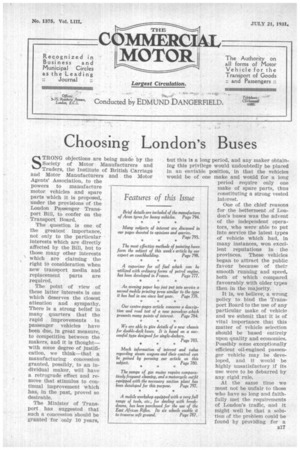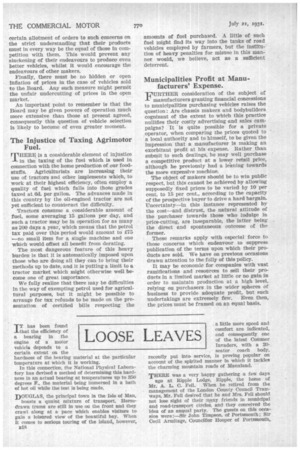Choosing London's Buses
Page 35

Page 36

If you've noticed an error in this article please click here to report it so we can fix it.
STRONG objections are being made by the Society a Motor Manufacturers and Traders, the Institute of British Carriage and Motor Manufacturers and the Motor Agents' Association, to the powers to manufacture motor vehicles and spare parts which it is proposed, under the provisions of the London Passenger Transport Bill, to confer on the Transport Board.
The , question is one of the greatest importance, not only to the particular interests which are directly affected by the Bill, but to those many other interests which are claiming the right to consideration when new transport media and replacement parts are required.
The point of view of these latter interests is one which deserves the closest attention and sympathy. There is a strong belief in many quarters that the rapid improvements in passenger vehicles have been due, in great measure, to competition between the makers, and it is thought— with some degree of justification, we think—that a manufacturing concession granted, possibly, to an individual maker, will have a retrograde effect and remove that stimulus to continual improvement which has, in the past, proved so desirable.
The Minister of Transport, has suggested that such a concession should be granted for only 10 years, but this is a long period, and any maker obtaining this privilege would undoubtedly be placed in an enviable position, in that the vehicles would be of one make and would for a long period require only one make of spare parts, thus constituting a strong vested interest.
One of the chief reasons for the betterment ,of London's buses was the advent of the independent operators, who were able to put into service the latest types of vehicle which had, in many instances, won excellent reputations in the provinces. These vehicles began to attract the public favour because of their smooth running and speed, both of which compared favourably with older types then in the majority.
It is, we believe, a wrong policy to bind the Transport Board to the use of any particular make of vehicle and we submit that it is of vital importance that this matter of vehicle selection should be based entirely upon quality and economies. Possibly some exceptionally efficient oil-engined passenger vehicle may be developed, and it would be highly unsatisfactory if its use were to be debarred by any rigid rule.
At the same time we must not be unfair to those who have so long and faithfully met the requirements of London's traffic, and it might well be that a solution of the problem could be found by providing for a certain allotment of orders to such concerns on the strict understanding that their products must in every way be the equal of those in competition with them. This would prevent any slackening of their endeavours to produce even better vehicles, whilst it would encourage the endeavours of other makers.
Finally, there must be no hidden or open inflation of prices in the case of vehicles sold to the Board. Any such measure might permit the unfair undercutting of prices in the open market.
An important point to remember is that the Board may be given powers of operation much more extensive than those at present agreed, consequently this question of vehicle selection Is likely to become of even greater moment.
The Injustice of Taxing Agrimotor Fuel.
!THERE is a considerable element of injustice in the taxing of the fuel which is used in connection with the home production of our foodstuffs. Agriculturists are increasing their use of tractors and other implements which, to work at their highest efficiency, often employ a quality of fuel which falls into those grades taxed at 6d. per gallon. The advances made in this country by the oil-engined tractor are not yet sufficient to counteract the difficulty.
Tractors consume a considerable amount of fuel, some averaging 15 gallons per day, and such a tractor may be in operation for as many as 200 days a year, which means that the petrol tax paid over this period would amount to £75 —no small item for a single machine and one which would offset all benefit from derating.
The most dangerous feature of this heavy burden is that it is automatically imposed upon those who are doing all they can to bring their methods up to date, and it is putting a limit to a tractor market which might otherwise well become one of great importance.
We fully realize that there may be difficulties in the way of exempting petrol used for agricultural purposes, but it might be possible to arrange for tax refunds to be made on the presentation of certified bills respecting the amounts of fuel purchased. A little of such fuel might find its way into the tanks of road vehicles employed by farmers, but the institution of heavy penalties for misuse in this manner would, we believe, act as a sufficient deterrent.
Municipalities Profit at Manufacturers' Expense.
"FURTHER consideration of the subject of -I-. manufacturers granting financial concessions to municipalities purchasing vehicles raises the question : Are chassis makers and bodybuilders cognizant of the extent to which this practice nullifies their costly advertising and sales campaigns? It is quite possible for a private operator, when comparing the prices quoted to a local authority and to himself, to be given the impression that a manufacturer is making an exorbitant profit at his expense. Rather than submit to such dealings, he may well purchase a competitive product at a lower retail price, although he previously had a leaning towards the more expensive machine.
The object of makers should be to win public respect, but this cannot be achieved by allowing supposedly fixed prices to be varied by 10 per cent. to 15 per cent., according to the capacity of the prospective buyer to drive a hard bargain. Uncertainty—in this instance represented by the cost—and distrust, the natural attitude of the purchaser towards those who indulge in price-cutting, are inseparable, the latter being the direct and spontaneous outcome of the former.
These remarks apply with especial force to those concerns which endeavour to suppress publication of the terms upon which their products are sold. We have on previous occasions drawn attention to the folly of this policy.
It may be economic for companies with vast ramifications and resources to sell their products in a limited market at little or no gain in order to maintain production at a high level, relying on purchasers in the wider spheres of business to provide adequate profit, but such undertakings are extremely few. Even then, the prices must be framed on an equal basis.




































































































